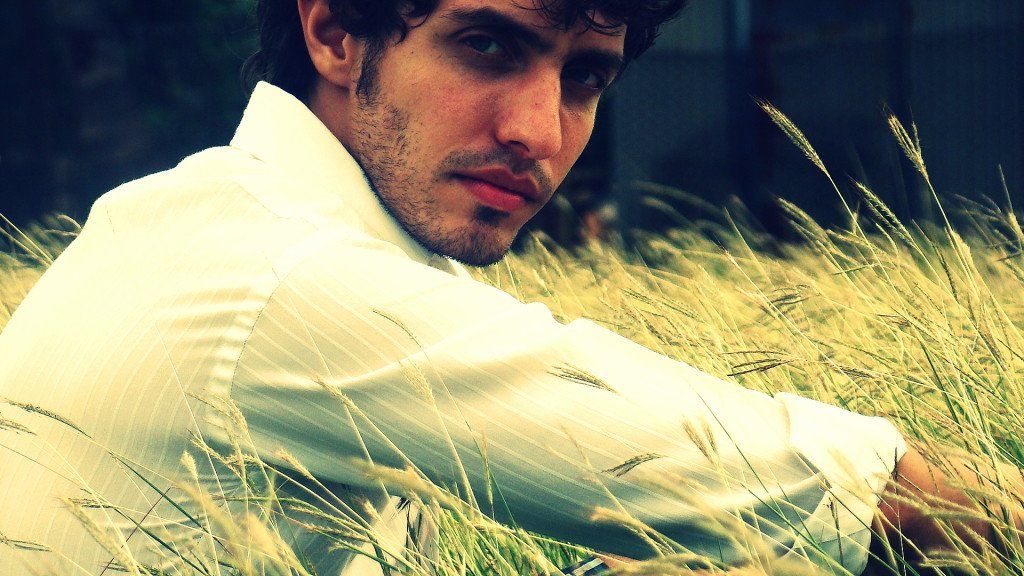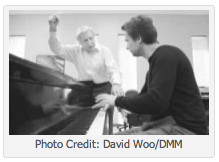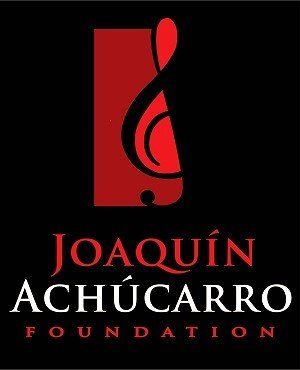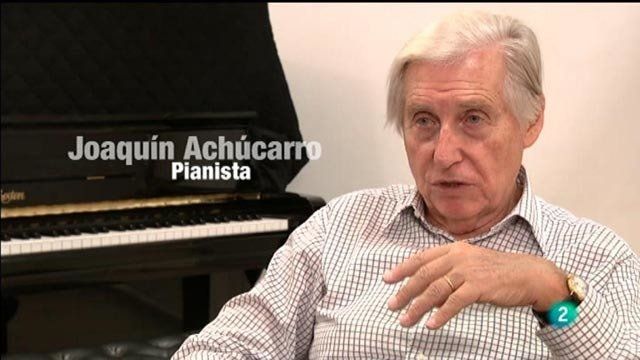October 26, 2011
By Peter Simek Joaquín Achúcarro doesn’t like being told he has had a long career. “My career is just beginning,” insists the pianist, who performed last week with the Dallas Symphony Orchestra. In many ways, he’s right. Achúcarro has recently released two DVD recordings with the London and Berlin Philharmonics, and his touring schedule remains ever busy. But the 78-year old pianist has also enjoyed a distinguished, quarter-century tenure at Southern Methodist University, which has seen him shape artists like Alessio Bax, who went on to win both the Leeds and Hamamatsu International Piano Competitions. We caught up with Achúcarro before last Thursday’s opening night to talk about teaching, performing, and his foundation, which helps jump-start young pianists’ careers. FrontRow: Right after this interview you are going to be choosing a piano for tonight’s performance. Is there something you look for specifically in the pianos you like to perform with? Joaquín Achúcarro: It depends on what kind of a hall I have. If I have a small hall, I want a soft tone, something which, you can make a piano sing. If the hall is big, and especially if you play with an orchestra, then the piano has to be more brilliant. But these are minor issues. If you have a good piano technician, as the Dallas Symphony has, then I’m sure I will have a good piano. FR: The piece you’ll perform tonight, Chopin’s Piano Concerto No. 2, I’ll assume you’ve played it many, many times. What is it like coming back to it again and again? JA: Any masterpiece I come back to again and again and I am happy – and happier and happier to go back to it. It is incredible because you thought that you have exhausted your possibilities of understanding the piece, and again you discover something hidden and marvelous that the composer has put there and maybe the first time you overlook them because maybe you were concerned with other problems. It is great to me. Have you been in the Prado? Have you been in the SMU Meadows Museum? How many times would you walk by the portrait of Queen Mariana ofAustriaand try to discern how many brushstrokes Velasquez has given it? How many times have you read again something of Shakespeare? When you hit a masterwork, it is endless. FR: This time through, are there specifics that you are noticing, or do you you’re yourself reinterpreting the piece? JA: There are no two sequels in the world, so it won’t be the same, of course. You have to fix what you want to say by trying. What leaves me breathless is that this amount of poetry and deep feelings, you go down into the human soul of emotions, and it has been composed by a boy of 19. That’s something that you don’t understand. And then, well, you say, “genius is genius.” There have been many in the history of humanity, and our profession has the advantage that we are in daily contact with some of the greatest minds that humanity has produced, I mean, Mozart, Beethoven, Bach, and so on. They are the greatest. FR: You’ve had a long career, and the international . . . JA: Oh, no, I am starting my career. Please quote that. FR: [Laughs.] What I mean is, there is so much traveling, many pianists get tired of the schedule, of being in so many different places, but you’ve continued. JA: I’ve enjoyed every aspect of my profession. Practice, rehearsals, concert, stage fright, travels, sleep in different places, in seven different beds in seven different nights, but I don’t mind. I will have a tour inEngland, and I will play with the Liverpool Philharmonic. And I will play with the London Philharmonic as well, this Brahms second piano concerto, which is in my first DVD with the London Symphony. This DVD has been so successful, to my surprise, which has led to another with the Berlin Philharmonic and Simon Rattle conducting, this time with a piece that is part of my – well all the pieces I play are a part of my soul. This is the “Nights in the Gardens of Spain,” which I did inDallasquite a few years ago with Eduardo Mata, and it was the piece that brought Eduardo and me together, to make music. So there are these two DVDs, so I’m just starting my career! FR: You’re a teacher, has that affected how you approach the music or taught you to think about the music differently? JA: I mean, the fact that things that you take for granted when you play the piano, the student can not make still. Then, your imagination starts to go, “why not?” And the urge of finding a solution to his or her problems makes you think. And of course, our profession is about thinking about music – and about technique and about expression and about poetry. FR: What brought you teaching? JA: When I cam to Dallas, I think one of the times I was playing with Eduardo, I also gave a recital at SMU and a master class. I didn’t know then that they were looking for a person to occupy the Joel Estes Tate Chair of Music. Overall, I know the piano department went to the dean, who at that time was Eugene Bonelli, who was then the president of the Dallas Symphony, and told him, ‘Stop the search, we have found our man.” That’s how it started. And it is almost a quarter of a century ago. So I am starting my career. FR: And you stayed in that position, as you said, for a quarter of a century. Has there been a temptation to move? What has it been about the SMU relationship that has made it so long lasting? JA: I have had some offers, which, of course, I cannot accept because the amount of affection, the amount of love that I have found in Dallas. I mean, the orchestra, SMU, and now the recently founded foundation, the Joaquin Achucarro Foundation — I would feel a traitor if I leftDallas. It is a part of my life. I came here and I thought it was going to be something superficial and temporary, but now it has become such part of myself — the love, the response and the feedback that I have found in so many parts of the society. FR: Why did you start the foundation? JA: It was the idea of Janet Kafka, the Spanish Honorary Consul. She thought my legacy – whatever it is – should be continued by my students and so on. The foundation is set up to help young pianists at the beginning of their career by establishing relationships where they can play concerts and then, how do I say, run up their programs, their careers, their emotions and feelings of giving concerts and traveling – to begin to know about this profession. And so the response has been so surprising to me. It has been a feeling of awe. It is something that has come, and I didn’t look for it, but I get this feeling that people love what I do. FR: How has it changed for a young pianist today compared to when you started or even when you started teaching? JA: Then, when I started my career, if you won an international competition, you were assured to have at least a manager or someone who was interested in you. I won this Liverpool competition that Zubin Mehta had won the previous year, and it was a manager inLondonwho was interested in promoting my career inEngland. And it started well, and the ball began to roll, and here I am, starting my career. FR: Is that enough, now, to win a competition? JA: No, because the number of competitions has grown exponentially, all over the world. I think only in Italy there are 200. And in Spain, Germany, England, all over the world – and that should be a good thing for a town to have a piano competition because people go and listen and guess who is going to win, so there is some kind of boiling spirit around the competition. And the big ones, like the Van Cliburn in Fort Worth, you tell me. I have been on the jury twice, and I felt that. The whole town is on it. FR: And isn’t that good for expanding enthusiasm for music? JA: I wonder if it is enthusiasm for music or if it is enthusiasm for competition. I mean if you go to a rodeo, you have enthusiasm for who is going to win. Of course you love the rodeo, but if you go to the Olympics, you may be happy with athletics. The same person who goes to the competition would go to a string quartet in which Bartok—would they go? There are less people who do that. FR : So if competitions are not enough to launch a young pianist’s career, what do they need to do? JA: I wonder. I mean, some are lucky. There are competitions that may still start a career, I mean the big, big ones – there are four or five in the world: Moscow, Chopin, Leeds, Fort Worth, who really help many pianists who are making their career. In fact, not long ago Alessio Bax played here, and he won the Leeds and theHamamatsu– two important competitions. Then it started his career. But the thing is to keep it going. A career is not a hundred meter dash, it is a marathon. Elements like being healthy and being open-minded to whatever may come is part of it. FR: Are there trends or fads, kinds of pianists who are favored right now, based on, say, stage presence, or things like that? JA: We have seen a few cases already of, how could I say, eccentric. To be eccentric is not to be genius, and many of those eccentric geniuses hid their shortcomings as strokes of genius. I’m trying to be careful about what I say, but if you look in the past we have seen several. FR: But to have a marathon career, is there a musical quality to sustain a career? JA: I think in the long run, the one who’s really good and gives true music would be appreciated, because people love true music. And there are people who go to the eccentrics, and there are people who go to the musicians. And it will go – it should. FR: We were talking about how piano competitions may be attractive to wider audiences because they are competition. But have you noticed a change in how people approach or respond to music since the time you started performing? JA: Then I didn’t care about what kind of people came to the concerts. Now you see that the average is well over 40. But now people who go to pop concerts who are 20, they will be 40, and maybe they will discover that Mozart has something to give them, and Chopin has something to give them that, I don’t know — you name the group — hasn’t yet given to them. Those pop concerts, they participate and they enjoy and they drink, but then there is a hidden part of our soul that still hasn’t been moved. And with a little more maturity they will naturally understand.







